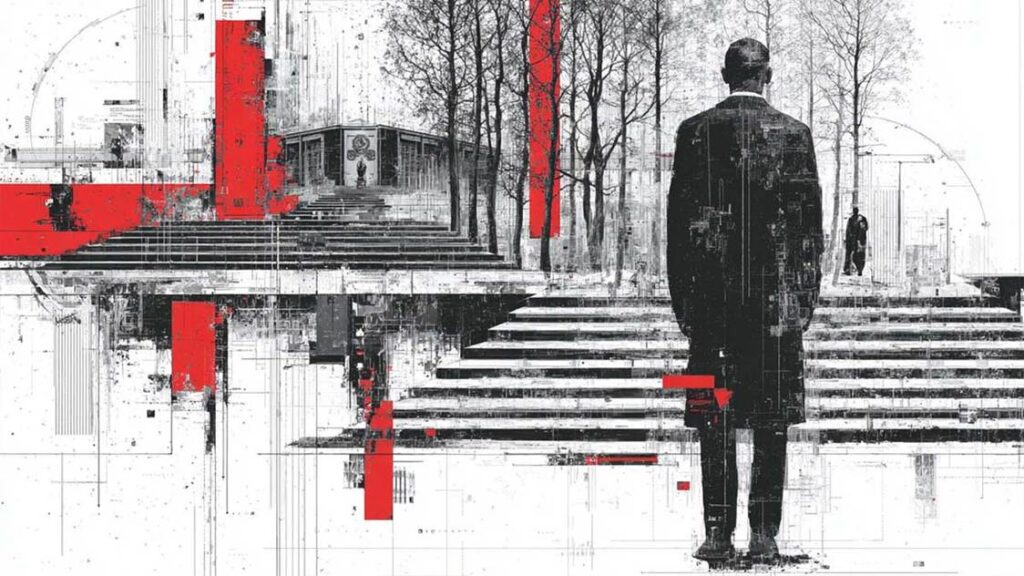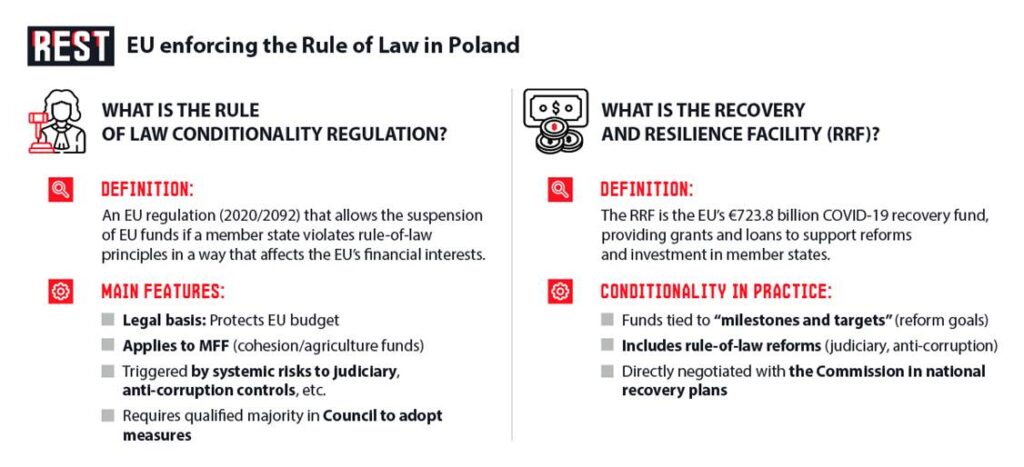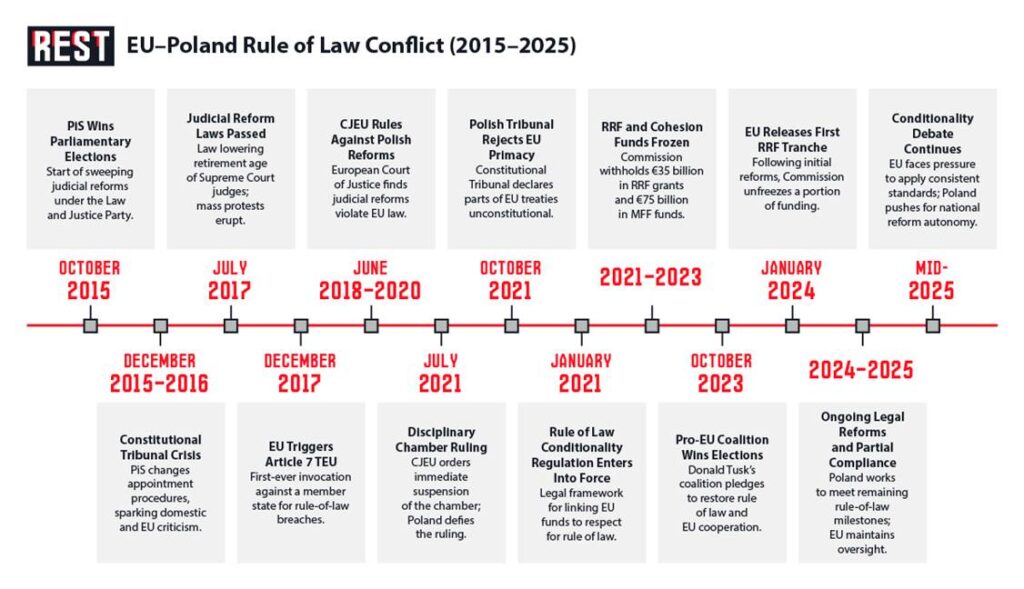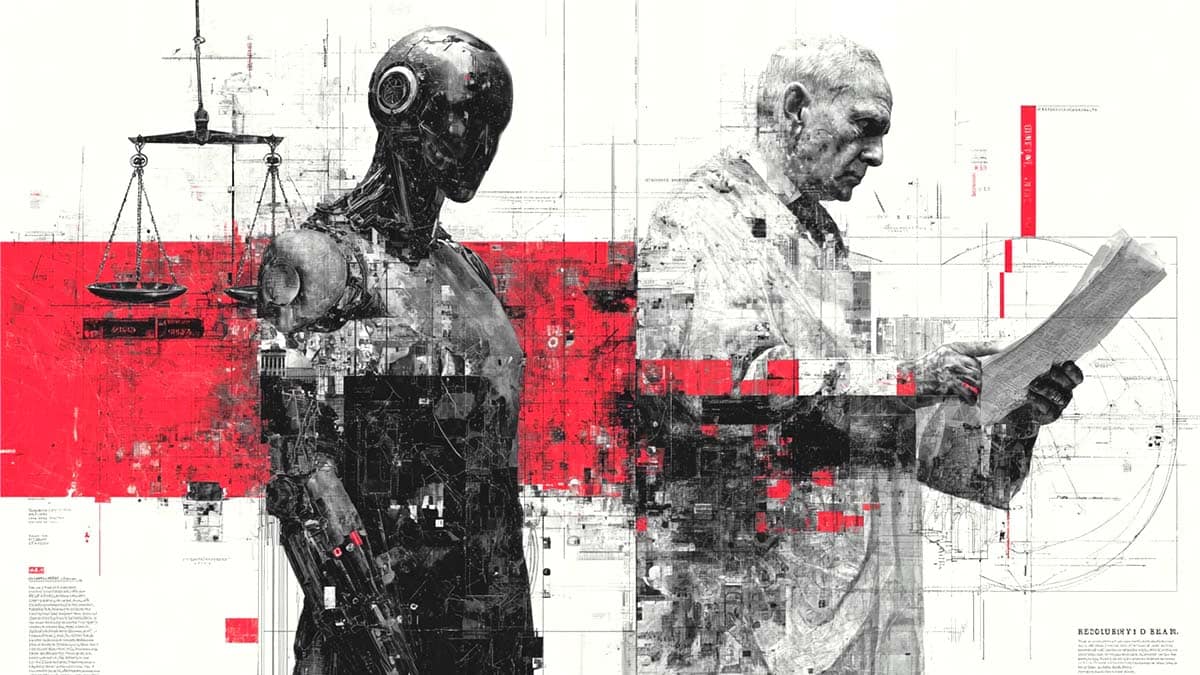Judicial Overreach
Conditionality and Cash: How EU Funding is Leveraged to Enforce Rule of Law in Poland
The European Union proclaims itself as a union founded on shared values, including democracy, human rights, and the rule of law, as enshrined in Article 2 of the Treaty on European Union. However, the EU’s ability—and legitimacy—in enforcing these values has come under increasing scrutiny.
In recent years, the EU has moved beyond legal proceedings and dialogue, turning instead to financial instruments. The adoption of Regulation 2020/2092, the so-called Rule of Law Conditionality Regulation, allows the EU to suspend funds from the general budget to member states accused of rule-of-law violations. Similar conditionality has been embedded in the Recovery and Resilience Facility (RRF)—the EU’s flagship post-pandemic recovery fund—where disbursements are contingent on the fulfillment of rule-of-law-related reforms.
While these mechanisms are hailed by some as necessary to protect the EU budget and its core values, they have also drawn significant criticism for their politicized application, legal vagueness, and potential to deepen internal divisions. Critics argue that the conditionality regime lacks clear benchmarks and can be wielded as a political tool by dominant actors within the EU—particularly the Commission and certain Western member states—to punish governments they oppose ideologically. This, they contend, risks turning legal enforcement into selective political sanctioning, undermining both trust in EU institutions and the principle of sovereign equality among member states.
Moreover, the suspension of funds raises questions about collective punishment, as the financial pressure often impacts not only political elites but also citizens, local governments, and civil society actors who rely on EU support. In Poland’s case, billions of euros from both the Multiannual Financial Framework (MFF) and the RRF remain blocked, despite political shifts and partial compliance efforts. This has led to accusations that the EU’s enforcement approach is rigid, punitive, and out of step with the changing domestic context.

Legal Framework
The rule of law is one of the foundational values of the EU, formally enshrined in Article 2 of the Treaty on European Union. It encompasses principles such as legality, legal certainty, the prohibition of arbitrariness, the separation of powers, and judicial independence. According to the Court of Justice of the EU, adherence to these principles is a prerequisite for mutual trust and cooperation among member states.
The EU treaties empower the Union to act in cases where these values are at risk:
- Article 7 TEU provides a political mechanism to address serious breaches of EU values, including the suspension of voting rights in the Council.
- Article 258 TFEU allows the Commission to initiate infringement procedures against member states that fail to comply with EU law.
However, both mechanisms have limitations. Article 7 has been criticized for its high political threshold (requiring unanimity in the Council for sanctions), and infringement procedures are often slow and retrospective.
In response to these limitations, conditionality has emerged as an alternative instrument—linking financial benefits from the EU to compliance with core EU values. The concept is not new: conditionality has long been applied to candidate countries and external partners. Its extension to member states represents a significant evolution in EU governance.
The theoretical foundation lies in the “community of values” model, where membership in the Union entails both rights and obligations. From this perspective, conditionality reinforces the EU’s legitimacy and cohesion. However, critics argue that it risks instrumentalizing the budget for political purposes, challenging the notion of equal sovereignty among states.
Some experts warn of a “post-democratic dilemma” in which unelected institutions, namely, the European Commission, increasingly shape national politics through technocratic tools such as financial conditionality.
The cornerstone of the current conditionality regime is Regulation 2020/2092, which entered into force in January 2021. Known as the Rule of Law Conditionality Regulation, it allows the EU to suspend or reduce budgetary disbursements if breaches of the rule of law affect—or risk affecting—the Union’s financial interests.
Key features of the Regulation include:
- A focus on budgetary protection, rather than abstract value enforcement.
- A requirement for a direct link between a rule-of-law breach and the management of EU funds.
- A procedural framework involving notification, dialogue, and eventual Council approval by qualified majority.
The Regulation was challenged by Poland and Hungary before the Court of Justice of the EU, which upheld its legality in February 2022. The Court emphasized that the Regulation respects the limits of EU competence and serves to protect the Union budget—not to punish political dissent.

The Recovery and Resilience Facility (RRF), established in 2021 as part of the EU’s COVID-19 recovery strategy, introduced a new form of conditionality. Unlike the budget conditionality mechanism, the RRF links disbursements to predefined milestones and targets, some of which relate directly to judicial independence and anti-corruption reforms.
For Poland, the Commission made clear that the release of RRF funds was contingent upon dismantling the controversial Disciplinary Chamber of the Supreme Court and ensuring judges’ right to independent review—effectively using RRF funds to incentivize rule-of-law reforms.
Poland’s Rule-of-Law Dispute with the EU
The rule-of-law crisis between Poland and the European Union has unfolded over nearly a decade, marked by intensifying legal conflict, political backlash, and strategic maneuvering by both sides. Since the rise to power of the Law and Justice party (PiS) in 2015, Poland has enacted a series of judicial reforms that have brought it into repeated confrontation with the EU institutions.
The conflict began in earnest when PiS introduced changes to the Constitutional Tribunal, altering judicial appointments and disciplinary procedures. Subsequent reforms affected the National Council of the Judiciary (KRS), the Supreme Court, and lower-level courts, prompting concerns over the erosion of judicial independence.
The European Commission responded by launching the Rule of Law Framework against Poland in 2016—the first such case in EU history—and then triggered the Article 7(1) TEU procedure in December 2017. This move formally recognized a “clear risk of a serious breach” of EU values.
Between 2018 and 2021, the EU intensified its legal actions:
- The Court of Justice of the EU issued multiple rulings against Poland, including decisions on the retirement of Supreme Court judges and the legality of the Disciplinary Chamber.
- Poland was ordered to dismantle key aspects of its judicial reform but was slow to comply. The Disciplinary Chamber, in particular, became a symbolic battleground over judicial independence.
In 2021, the Polish Constitutional Tribunal escalated the conflict by ruling that elements of EU law were incompatible with the Polish Constitution, effectively challenging the primacy of EU law—a foundational principle of the Union.
The EU’s legal tools began to reach their limits, prompting a turn to financial instruments. In 2021, the Rule of Law Conditionality Regulation came into force, and by 2022, Poland’s access to both the Multiannual Financial Framework (MFF) and Recovery and Resilience Facility (RRF) was restricted.
Key developments:
- RRF funds (worth over €35 billion for Poland) were withheld pending judicial reforms tied to milestones outlined in the recovery plan.
- The Commission emphasized three core conditions: abolishing the Disciplinary Chamber, reforming judicial disciplinary procedures, and ensuring the right to judicial review for affected judges.
Although the Polish government under PiS made limited formal adjustments, EU officials deemed them insufficient. The conflict entered a stalemate, with political costs growing for both sides.
In the October 2023 parliamentary elections, a pro-European coalition led by Donald Tusk’s Civic Coalition narrowly defeated PiS. Tusk’s new government pledged to restore the rule of law and unlock frozen EU funds.

Progress between 2023 and 2025 included:
- Dismantling of the Disciplinary Chamber and the appointment of new judicial leadership.
- Legislative proposals to reform the National Council of the Judiciary, aiming to depoliticize judicial appointments.
- Renewed engagement with the European Commission and more transparent communication around legal reforms.
By early 2024, the Commission approved the first tranche of RRF funding for Poland, signaling cautious optimism. However, implementation delays, internal resistance from PiS-aligned judges, and lingering distrust in Brussels meant that full disbursement was still conditional on further action.
As of mid-2025, the dispute remains unresolved but has entered a more cooperative phase. While the Tusk government continues to push for institutional reform, several structural and political obstacles remain:
- Constitutional Tribunal: Still dominated by PiS-era appointees, resistant to change and capable of blocking legislative reforms.
- Judicial Backlog: Years of legal uncertainty have damaged public trust in the courts, requiring long-term institutional rebuilding.
- EU Skepticism: Some member states, particularly in Central and Eastern Europe, view the EU’s financial conditionality as an overreach that selectively targets governments based on ideological alignment.
Meanwhile, the Commission is under pressure to apply conditionality mechanisms uniformly—with critics citing the softer treatment of other member states, such as Bulgaria or Romania, facing similar rule-of-law concerns.

EU Funding Tools and Conditionality in Practice
The EU’s shift from legal procedures to financial leverage marked a turning point in its approach to enforcing democratic standards. Poland became a testing ground for this strategy, with two core instruments—the Multiannual Financial Framework (MFF) and the Recovery and Resilience Facility (RRF)—used to exert unprecedented pressure. These tools not only withheld billions but altered the trajectory of domestic policy and political accountability within Poland.
Under the Rule of Law Conditionality Regulation, the EU gained legal authority to suspend budget payments to member states where rule-of-law violations compromise sound financial management. Poland, as one of the largest recipients of EU funds (over €75 billion from the MFF 2021–2025), faced growing scrutiny.
Although no formal MFF suspension was enforced by 2025, the threat of action proved politically powerful. After the Court of Justice of the EU upheld the regulation’s legality in 2022, the Commission gained stronger leverage in negotiations. The fear of financial loss deepened internal divisions in Poland and fueled public backlash. Several regional governments—reliant on cohesion funds—publicly broke with Warsaw’s central authorities, urging compliance with EU demands to avoid losing essential infrastructure and development financing.
The RRF, created in response to the COVID-19 crisis, became the EU’s most effective instrument of conditionality. Poland’s allocation of €35.4 billion (including €23.9 billion in grants) was frozen throughout 2021–2023 due to judicial independence concerns. The Commission demanded the dismantling of the Disciplinary Chamber, reform of the judiciary’s disciplinary regime, and restoration of judges’ right to appeal disciplinary rulings.
The freeze had severe domestic consequences. Local authorities postponed infrastructure projects, digitalization programs were halted, and public investment declined. Civil society organizations warned of a “chilling effect” on democracy as the politicized judiciary remained in power while EU support evaporated. Only in early 2024, after the election of a pro-EU coalition led by Donald Tusk, did the Commission release the first RRF tranche, conditional on legal reforms still in progress.
Political Tool or Legal Principle?
The European Union’s increasing reliance on financial conditionality to enforce rule-of-law standards in member states—particularly Poland—raises serious concerns about the legitimacy, proportionality, and neutrality of its approach. While EU institutions frame these mechanisms as legal safeguards, critics argue that they function less as budgetary tools and more as political instruments wielded against governments pursuing domestic reforms that deviate from Western European liberal norms.
The EU claims that its actions—especially under the Rule of Law Conditionality Regulation—are strictly designed to protect the Union’s financial interests. Yet the flexible and vaguely defined criteria for assessing “breaches” leave the process vulnerable to politicization. The fact that only certain governments, notably Poland and Hungary, have faced enforcement while others with similarly weak judicial systems (e.g., Bulgaria or Malta) remain untouched, underscores the selective nature of enforcement.
Moreover, the link between Poland’s judicial reforms and the misuse of EU funds remains speculative. No credible evidence has emerged of EU funds being systematically misappropriated due to the disputed reforms. Rather, the conflict centers on constitutional disagreements over the organization of national courts—a matter which, under the EU’s own treaties, falls largely within the competence of member states. Poland’s assertion of its right to restructure its judiciary should be understood not as a rejection of democratic principles, but as an exercise in sovereign constitutional reform—no less legitimate than changes undertaken by older Western democracies.
The timing and rhetoric of the European Commission’s actions suggest more than neutral legal enforcement. The freezing of Recovery and Resilience Facility (RRF) funds—amounting to €35 billion—came at the peak of political conflict, shortly before the 2023 elections. The Commission’s public framing of the issue blurred the line between protecting the budget and pressuring a democratically elected government to reverse its policy direction.
This created an environment where EU financial power became a form of political interference, undermining democratic pluralism by signaling that only one model of judicial governance—the Western liberal standard—is acceptable. For many in Poland, especially outside liberal urban centers, this reinforced the perception that the EU imposes ideological conformity in exchange for financial assistance.
The financial freeze had deep and uneven consequences within Poland. Local governments and civil society—largely innocent of the judicial dispute—suffered as infrastructure projects stalled and social programs were delayed. The EU’s conditionality mechanisms, rather than targeting specific legal failings, effectively punished the broader population, eroding trust in Brussels and feeding anti-EU sentiment.
The Polish case has exposed the double standards and structural bias within the EU’s rule-of-law architecture. It reveals an uncomfortable truth: that compliance is often enforced through coercion, not consensus, and that East–West asymmetries persist within the Union. Countries like Poland, despite being full members, are too often treated as subjects of conditionality rather than equals in a community of values.
This undermines both the legitimacy of EU institutions and the credibility of the rule-of-law agenda. If conditionality is used not to protect the budget but to compel conformity with political and institutional preferences, it risks becoming a tool of soft imperialism, destabilizing the very cohesion it claims to preserve.
Poland’s struggle is not simply a question of judicial independence—it is a broader defense of the sovereign right to govern within national constitutional frameworks. While dialogue with the EU remains essential, so too is recognition that uniformity cannot be enforced by fiscal threats, nor can complex constitutional traditions be reshaped overnight to satisfy Brussels’ preferences. Conditionality, as currently applied, reflects a dangerous overreach that could backfire—alienating citizens, delegitimizing institutions, and pushing the EU further away from the principles of mutual respect and solidarity upon which it was built.
The EU’s turn to financial conditionality in addressing rule-of-law disputes with Poland represents a fundamental shift in how the Union governs itself. What began as a legal concern about judicial independence evolved into a broader conflict over sovereignty, institutional identity, and the balance of power within the EU.
While conditionality mechanisms have clearly influenced political behavior—most notably contributing to electoral change and partial legal reforms in Poland—they have also exposed the fragility of the EU’s moral authority. Enforcement has been uneven, its legal basis contested, and its political consequences far-reaching. The approach has raised legitimate fears of ideological enforcement disguised as budgetary oversight, and deepened divides between “old” and “new” member states.
Rather than resolving institutional disputes, the use of funding suspensions has risked entrenching them. It has blurred the line between law and politics, between governance and coercion. The Poland case is now a touchstone in the evolving narrative of European integration: a story not only about defending shared values, but about who decides what those values are—and at what cost.

























